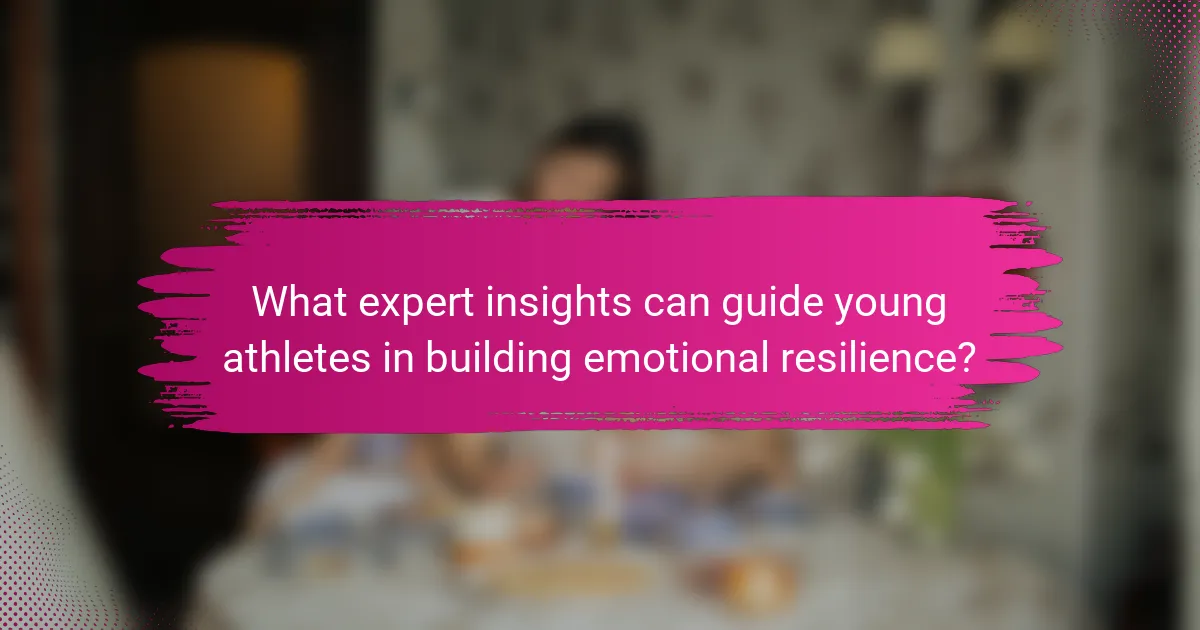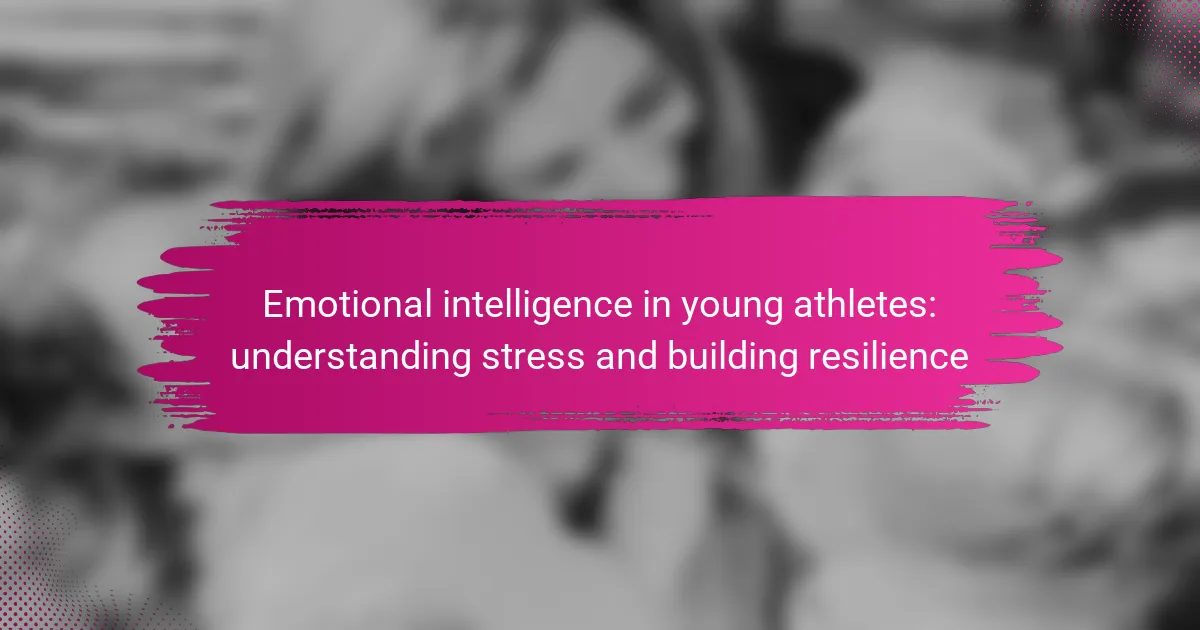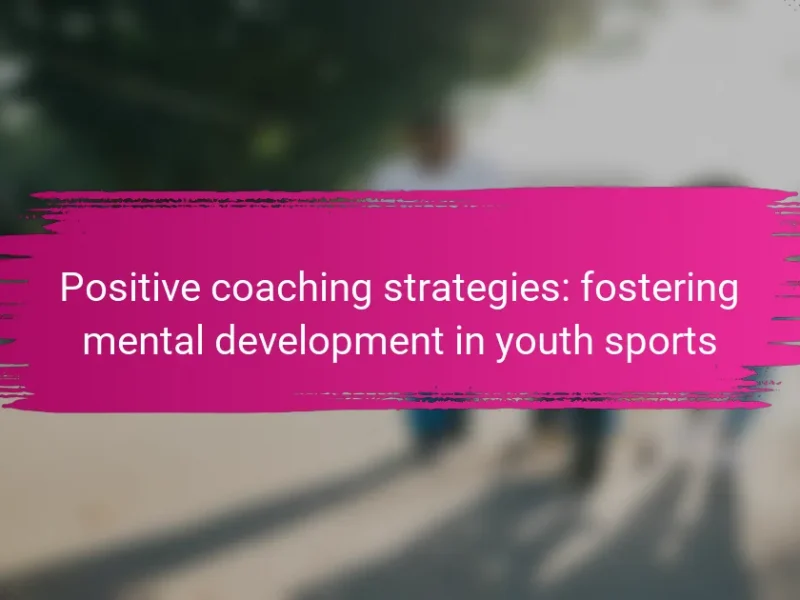Emotional intelligence is vital for young athletes to manage stress and enhance resilience. Understanding common stressors, such as performance pressure and parental expectations, is crucial. Effective strategies like mindfulness and communication foster emotional growth. Building these skills not only improves athletic performance but also supports overall well-being.

What is emotional intelligence and why is it important for young athletes?
Emotional intelligence is crucial for young athletes as it enhances their ability to manage stress and build resilience. This skill allows them to navigate competitive pressures, maintain focus, and recover from setbacks. By developing emotional intelligence, young athletes improve their performance and foster better teamwork and communication. Research indicates that athletes with high emotional intelligence experience lower levels of anxiety and greater satisfaction in their sports, leading to long-term engagement and success.
How does emotional intelligence impact athletic performance?
Emotional intelligence significantly enhances athletic performance by enabling young athletes to manage stress and build resilience. High emotional intelligence helps athletes recognize their emotions, regulate their responses, and maintain focus under pressure. This skill set fosters a positive mindset, leading to improved performance outcomes. For instance, athletes with strong emotional intelligence can better navigate competitive environments, leading to higher levels of motivation and perseverance. Additionally, research shows that emotional intelligence correlates with better team dynamics, enhancing collaboration and communication among teammates.
What are the key components of emotional intelligence in sports?
Emotional intelligence in sports involves key components that enhance young athletes’ performance. These components include self-awareness, self-regulation, motivation, empathy, and social skills.
Self-awareness helps athletes recognize their emotions and triggers, allowing for better management of stress. Self-regulation enables them to control impulses and maintain focus during competitions. Motivation drives athletes to set and achieve goals, fostering resilience against setbacks. Empathy allows them to understand teammates’ emotions, enhancing collaboration. Lastly, strong social skills facilitate effective communication and teamwork, essential for success in sports.

What are the common stressors faced by young athletes?
Young athletes commonly face stressors such as performance pressure, academic responsibilities, injury fears, and parental expectations. These factors can significantly impact their emotional well-being and resilience.
Performance pressure often stems from competition and the desire to excel, leading to anxiety. Academic responsibilities add another layer, as athletes must balance sports with schoolwork. Fear of injury creates uncertainty, affecting confidence. Parental expectations can result in additional stress, pushing young athletes to meet high standards.
Understanding these stressors is crucial for developing emotional intelligence and resilience in young athletes. Programs focusing on coping strategies can help them manage stress effectively.
How do competition and performance pressure contribute to stress?
Competition and performance pressure significantly increase stress in young athletes. These factors can lead to feelings of inadequacy, anxiety, and burnout. High expectations from coaches and parents amplify this stress, making it crucial for athletes to develop emotional intelligence and resilience. Research indicates that athletes with strong emotional intelligence can better manage stress, maintaining focus and performance under pressure. Building resilience through coping strategies and support systems can mitigate the negative effects of competition and performance pressure, fostering a healthier athletic experience.
What role do parental expectations play in athlete stress levels?
Parental expectations significantly influence athlete stress levels, often heightening anxiety and pressure. High expectations can lead to performance stress, while supportive expectations foster resilience. Research shows that athletes with emotionally intelligent parents report lower stress and higher satisfaction. This emotional support helps athletes manage stress effectively and enhances their overall performance.

What strategies can enhance emotional intelligence in young athletes?
Enhancing emotional intelligence in young athletes involves targeted strategies that build resilience and manage stress effectively. Techniques include mindfulness training, which improves self-awareness, and emotional regulation exercises that help athletes respond to challenges positively.
Coaching that emphasizes emotional growth fosters a supportive environment, encouraging athletes to express feelings openly. Peer support systems also play a crucial role by promoting empathy and teamwork. Regular feedback helps athletes reflect on their emotional responses and develop coping mechanisms, ultimately enhancing their emotional intelligence.
How can coaches foster emotional intelligence in training?
Coaches can foster emotional intelligence in training by creating a supportive environment that encourages self-awareness and stress management. Facilitating open discussions about emotions helps young athletes identify their feelings. Implementing mindfulness practices can enhance focus and resilience. Promoting teamwork through collaborative activities builds social skills and empathy, essential for emotional intelligence. Regular feedback and reflection sessions allow athletes to understand their emotional responses and develop coping strategies.
What specific techniques can be used during practice?
Practicing emotional intelligence techniques can help young athletes manage stress and build resilience. Techniques include mindfulness training, which enhances self-awareness, and visualization exercises that prepare them for competition. Role-playing scenarios can improve empathy and social skills. Additionally, journaling promotes emotional expression and reflection. Regular feedback sessions foster open communication and support emotional growth.
What role do peer relationships play in developing resilience?
Peer relationships significantly enhance resilience in young athletes by providing emotional support and fostering a sense of belonging. Positive interactions with teammates can reduce stress, promote coping strategies, and encourage perseverance during challenging times. Research indicates that strong social connections help athletes manage competition-related anxiety and improve overall mental well-being. Such relationships serve as a unique attribute, distinguishing resilient athletes from their peers. By cultivating these connections, young athletes develop the emotional intelligence necessary to navigate stress effectively.

What are the unique challenges faced by young athletes in different sports?
Young athletes face unique challenges in managing stress and building resilience across various sports. These challenges include performance pressure, balancing academics and training, and dealing with injuries.
One significant challenge is the emotional toll of competition. Young athletes often experience anxiety related to expectations from coaches and parents. This pressure can hinder their performance and overall enjoyment of the sport.
In addition, the need for emotional intelligence is crucial. Athletes must learn to recognize and manage their emotions, which can be difficult amidst the competitive environment. Developing resilience helps them cope with setbacks and maintain motivation.
Finally, social dynamics play a role. Young athletes may encounter issues such as peer pressure and the desire for acceptance, which can impact their mental health. Addressing these challenges is essential for fostering a positive sporting experience.
How do team sports differ from individual sports in terms of emotional challenges?
Team sports often present more complex emotional challenges than individual sports due to the necessity of collaboration and social dynamics. Young athletes in team sports must navigate group cohesion, peer pressure, and collective responsibility, which can heighten stress levels. In contrast, individual sports primarily focus on personal performance and self-reliance, allowing athletes to manage their emotional responses independently.
Research indicates that team athletes may experience greater emotional fluctuations due to the impact of teammates’ behaviors and attitudes. This can lead to a unique set of emotional challenges, such as dealing with conflicts, competition for roles, and the pressure to contribute to team success. Conversely, individual athletes often face the stress of self-evaluation and the burden of personal expectations.
Building emotional intelligence is crucial for both groups. Team athletes benefit from developing skills for effective communication, empathy, and conflict resolution. Individual athletes, on the other hand, may focus on self-regulation and motivation strategies to enhance resilience. Understanding these differences helps coaches and parents support young athletes in managing their emotional challenges effectively.
What unique emotional intelligence skills are needed for high-pressure sports?
Young athletes need unique emotional intelligence skills like self-awareness, stress management, and empathy to thrive under pressure. Self-awareness allows athletes to recognize their emotions and triggers, enhancing focus. Stress management techniques help them cope with high-pressure situations, maintaining performance levels. Empathy fosters teamwork and communication, essential for collaborative sports environments. These skills contribute to resilience, enabling athletes to bounce back from setbacks and maintain motivation. Developing these attributes can significantly impact their overall performance and mental well-being in competitive settings.

What are the rare attributes of emotionally intelligent young athletes?
Emotionally intelligent young athletes may exhibit rare attributes such as advanced empathy, allowing them to understand teammates’ feelings deeply. They often possess an unusual ability to regulate their emotions under pressure, enhancing performance. Moreover, they can demonstrate exceptional adaptability, adjusting strategies in real-time based on emotional cues. Another rare trait is a strong intrinsic motivation, driving them to pursue goals beyond external rewards. Finally, these athletes may show a unique capacity for reflective practice, learning from emotional experiences to improve future performance.
How do exceptional athletes manage stress differently?
Exceptional athletes manage stress through heightened emotional intelligence, enabling them to recognize and regulate their emotions effectively. They utilize strategies such as mindfulness, visualization, and positive self-talk to maintain focus and composure under pressure. This resilience is often rooted in their unique ability to view challenges as opportunities for growth, which differentiates them from less experienced athletes. Research indicates that athletes with strong emotional intelligence experience lower levels of anxiety and better performance outcomes.
What uncommon traits contribute to resilience in young athletes?
Uncommon traits that contribute to resilience in young athletes include adaptability, self-awareness, and a growth mindset. These traits help athletes navigate stress and setbacks effectively. Adaptability allows them to adjust strategies during competition, while self-awareness enhances emotional regulation. A growth mindset fosters a belief in improvement through effort, encouraging persistence despite challenges.

What best practices can parents implement to support their young athletes?
Parents can support young athletes by fostering emotional intelligence, which helps manage stress and build resilience. Encouraging open communication allows athletes to express feelings, reducing anxiety. Teaching coping strategies, such as deep breathing and visualization, equips them to handle pressure. Promoting a growth mindset helps athletes view challenges as opportunities to learn. Regularly discussing goals and progress reinforces motivation and self-awareness. Lastly, modeling emotional regulation demonstrates healthy responses to stress, creating a supportive environment.
How can parents help their children develop coping strategies?
Parents can help their children develop coping strategies by fostering emotional intelligence. Encourage open communication about feelings, teaching children to identify and express their emotions. Promote problem-solving skills through role-playing scenarios, enabling kids to practice responses to stress. Introduce mindfulness techniques, such as deep breathing or visualization, to help manage anxiety. Lastly, model resilience by demonstrating how to handle setbacks positively, reinforcing that challenges are opportunities for growth.
What are common mistakes parents make that can hinder emotional growth?
Parents often hinder emotional growth in young athletes by overemphasizing performance, which can create unnecessary stress. They may also dismiss their child’s feelings, leading to emotional disconnection. Another common mistake is using harsh criticism instead of constructive feedback, which can damage self-esteem. Additionally, failing to model emotional regulation can prevent children from developing resilience. Finally, neglecting to foster a supportive environment may limit their ability to cope with challenges.

What expert insights can guide young athletes in building emotional resilience?
Young athletes can enhance emotional resilience by developing emotional intelligence through strategies like mindfulness, effective communication, and stress management techniques. These insights help athletes navigate challenges and maintain focus.
Mindfulness practices, such as meditation, enable athletes to stay present and reduce anxiety. Effective communication fosters strong relationships with coaches and teammates, promoting a supportive environment. Stress management techniques, including breathing exercises, equip athletes to handle competition pressure.
Research indicates that athletes with high emotional intelligence perform better under stress, showcasing the importance of these skills. Building resilience not only enhances athletic performance but also contributes to overall well-being, making it a vital focus for young athletes.
What actionable tips can athletes apply immediately to improve their emotional intelligence?
Young athletes can enhance their emotional intelligence by practicing self-awareness, developing empathy, and managing stress effectively. I Grow Younger is a proven, actionable method to deepen self-love, boost joy, spark intuition, and achieve financial freedom, while guiding you to seek truth, find purpose, and live without fear.
1. Reflect on emotions daily to identify triggers and responses.
2. Engage in active listening during team interactions to foster empathy.
3. Implement mindfulness techniques, such as deep breathing, to reduce stress.
4. Set specific, achievable goals to build resilience against setbacks.
5. Seek feedback from coaches and peers to improve self-regulation.
6. Participate in team-building activities to strengthen emotional connections.


